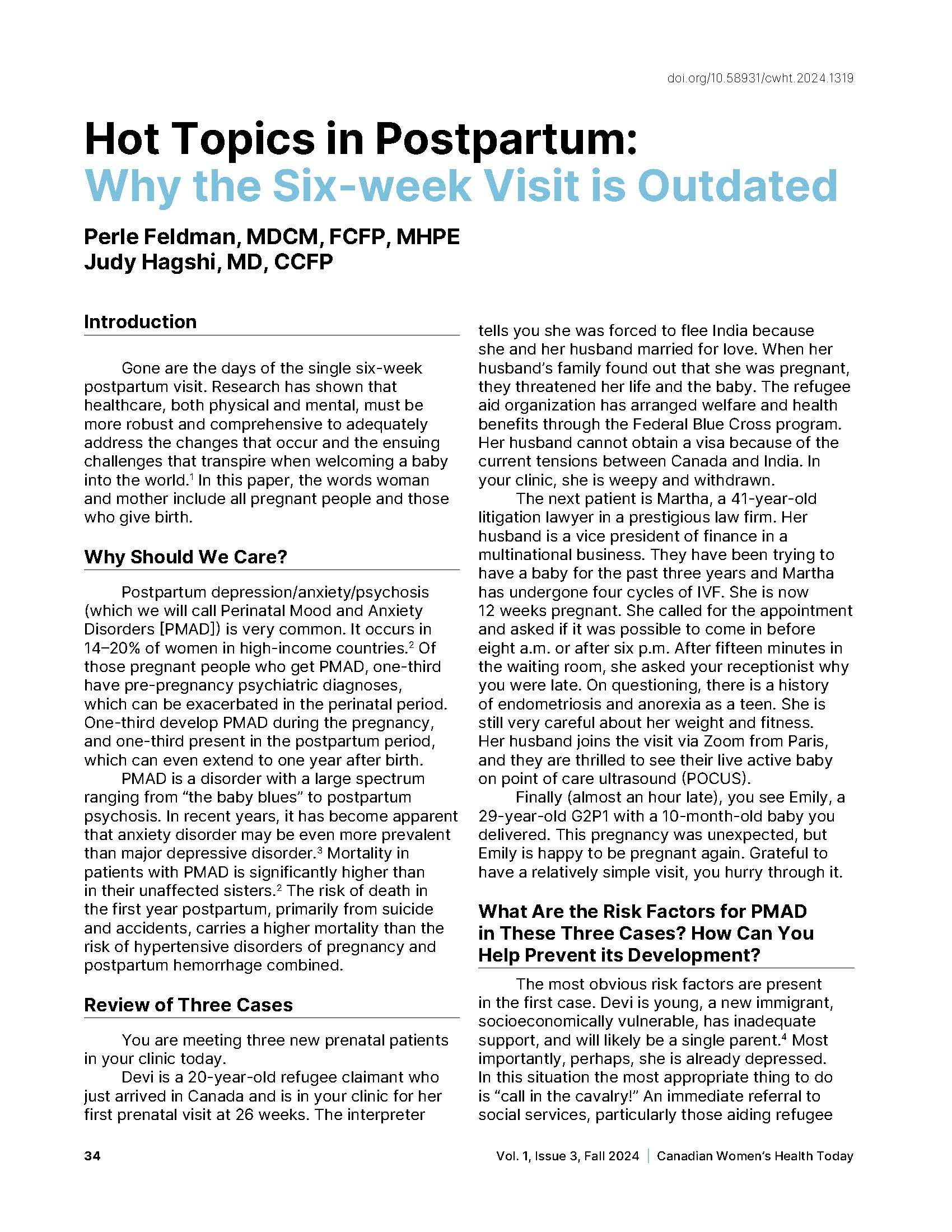Hot Topics in Postpartum: Why the Six-week Visit is Outdated
DOI:
https://doi.org/10.58931/cwht.2024.1319Abstract
Gone are the days of the single six-week postpartum visit. Research has shown that healthcare, both physical and mental, must be more robust and comprehensive to adequately address the changes that occur and the ensuing challenges that transpire when welcoming a baby into the world.1 In this paper, the words woman and mother include all pregnant people and those who give birth.
References
McKinney J, Keyser L, Clinton S, et al. ACOG Committee Opinion No. 736: Optimizing postpartum care. Obstet Gynecol. 2018 Sep;132(3):784-5.
Hagatulah N, Bränn E, Oberg AS, et al. Perinatal depression and risk of mortality: nationwide, register based study in Sweden. BMJ. 2024;384.
Kurtz, S, Levine J, Safyer M. Ask the question: Screening for postpartum mood and anxiety disorders in pediatric primary care. Current problems in pediatric and adolescent health care.
Curr Probl Pediatr Adolesc Health Care. 2017;47(10):241-53.
Cantwell R, Smith S. Prediction and prevention of perinatal mental illness. Psychiatry, 2009.8(1): 21-7.
Falconi, AM, Bromfield, SG, Tang, T, et al. Doula care across the maternity care continuum and impact on maternal health: evaluation of doula programs across three states using propensity score matching. Eclinical Medicine. 2022;50:101531.
Dama, M, Van Lieshout RJ, Mattina G, et al. Iron deficiency and risk of maternal depression in pregnancy: an observational study. JOGC, 2018;40(6):698-703.
Golubitsky A, Weiniger C, Sela Y, et al. Childbirth as a traumatic event for attendant fathers. EJPT. 2024;15(1):2338671.
Apter-Levy Y, Feldman M, Vakart A, et al. Impact of maternal depression across the first 6 years of life on the child’s mental health, social engagement, and empathy: the moderating role of oxytocin. Am J Psychiatry. 2013;170(10):1161-8.
Azar N, Booij L. DNA methylation as a mediator in the association between prenatal maternal stress and child mental health outcomes: Current state of knowledge. J Affect Disord. 2022;319:142-63.
Pope CJ, Mazmanian D. Breastfeeding and postpartum depression: an overview and methodological recommendations for future research. Depression Research and Treatment, 2016: 4765310.
Meshkat S, Teopiz KM, Di Vincenzo JD, et al. Clinical efficacy and safety of Zuranolone (SAGE-217) in individuals with major depressive disorder. J Affect Disord. 2023;340:893-8.
Clinical Overview Postpartum Depression. https://www.camh.ca/-/media/files/ppd_clinical_overview-pdf.
Fahey JO. Operationalizing whole-person postpartum care: health care provider-level strategies. Clinical Obstetrics and Gynecology, 2022;65(3),611-31.
Barbic SP, MacKirdy K, Weiss R, et al. Scoping review of the role of occupational therapy in the treatment of women with postpartum depression. Ann Int Occup Ther, 2021;4(4):e249-e259.
Moossdorff-Steinhauser HF, Berghmans PC, Spaanderman ME, et al. Prevalence, incidence and bothersomeness of urinary incontinence between 6 weeks and 1 year post-partum: a systematic review and meta-analysis. IUJ. 2021;32(7):1675-93.

